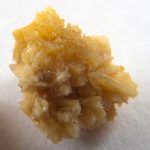 Are hardened mineral deposits that form in the kidney.
Are hardened mineral deposits that form in the kidney.
Concentrations of insoluble material ranging from a fraction of an inch to several inches in diameter that are formed in the urinary tract.
A hard mass of calcium like a little piece of stone which forms in the kidney.
Precipitates of calcium phosphate or oxalate. These stones vary in size from the size of coarse gravel to that of a pea. Also called calculi; the condition is called urolithiasis or nephrolithiasis.
A condition in which some solid matter separates from the urine flowing through the kidney and forms a stone inside the kidney or elsewhere in the urinary tract. Stones vary greatly in size and may be excruciatingly painful. Small stones may pass out of the urinary tract along with urine. Larger ones may obstruct the urinary tract or cause damage during passage.
Also known as renal calculi; stones composed of abnormal chemical deposits that form inside the urinary tract. Kidney stones are hard and range in size from a grain of sand or larger than a marble. When they are very small, they pass out of the kidneys through the ureters (two narrow tubes, each connecting a kidney and the bladder) in the urine. If they are large, they may remain in the kidneys or travel into a ureter where they become trapped, causing a variety of symptoms that include extreme back pain or pain in the side, blocked urine flow, and bleeding. Other symptoms include nausea and vomiting, as well as blood in the urine.
A mass of salts in the kidney or urinary tract.
A solid concretion that develops within the urinary system, which can induce discomfort, hemorrhage, blockage, and/or infection, is commonly referred to as a stone. These formations predominantly consist of calcium.
